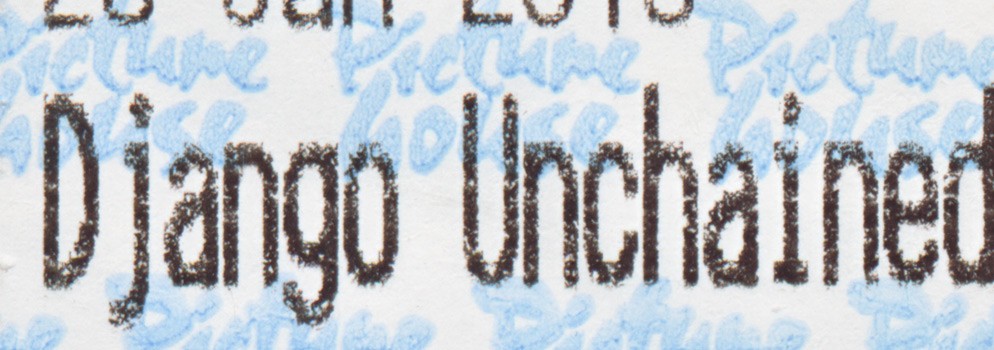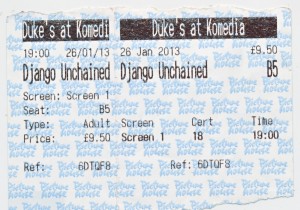Django Unchained

Spoilt for choice.
I’ve gone on and on about how director’s are not auteurs, and I’ve gone and on and on and additionally on about how I contradict myself, so let’s do both, or the first but not the second until later.

Mr. Quentin Tarantino is an auteur. I’ve said that directors don’t make films, and that’s still true, but Mr. Tarantino is also an author. Usually this would argue for some sort of consistency, but by agreeing with everyone that he’s an auteur, this means I’m contradicting myself again, though I did say I would do it. I’m consistent. In that.
The data: Django Unchained, at best, a mediocre film. Hardly great, but in no way poor, almost a perfect 5/10. A lot of waiting around, some clever bits, a ton of gratuitous sadism, and all around sense of self-congratulations of a man not used to waiting long for praise. It was boring, and then it wasn’t and then it was again. And then it really was. Again, Mr. Tarantino is an artist, which should be read aloud with the contempt that drips from my tongue when I say it. Like when you say ‘racist’. Or ‘drips’. Eww.
The point being that as an auteur, he has zero interest in structure, in telling a story, in fitting into a genre, or in what an audience what might see or perceive, only in what comes spews forth, and in capturing same. Tarantino, for all the shit I give him, and all the ill-concealed jealousy I throw his way, has reinvented cinema twice, which is three times more than I ever will. And spew is not a bad thing, nor is it a good one. It can lead to great films, and to terrible ones, and, as Django Unchained proves, perfectly mediocre ones. I had completely given up on Mr. Tarantino after the execrable Kill Bill, and then really given up on him after Death Proof, which, like Hollywood Ending isn’t just an off day in an artist’s œuvre, but one of the worst films of all time. And so, I might have never seen Inglorious Basterds, which I did only begrudgingly and on video no less, and was, naturally enough, blown away. What the hell was that?
Lucky me, I now knew that Mr. Tarantino was not a lucky sadist hack in a perilous decline, but a wildly uneven nutcase, though still a sadist. Eh, whatcha gonna do, not watch his films? As such I was more than willing to see Django Unchained, a film that confers Mr. Tarantino auteur status again, this time with its mediocrity. The-D-Is-Silent-Is-Not-Actually-A-Funny-Line-Even-If-You-Tell-The-Audience-It-Is Django is not Basterds but they are from the exact same place. How to explain?
Basterds with all its turns of phrase and eye-popping performances had tension: each scene, even if the dialog was not as strong as we might like, always felt like something was about to explode. And yet Django has virtually none, a story that unfolds with all the surprise of a train track. We know everything that’s going to happen, and we’re not disappointed. Unless you think disappointment comes when you get what you expect. Which you might, because this is technically the definition of disappointment.
Strangely, it's the kind of cheap plot device that is a feature of the single character film. The fact that it combines misogyny with laziness is just blind luck.
The almost adolescent desire to avoid story crystalizes in the scene where Herr Waltz sacrifices himself. Given the choice between getting away and seeking a kind of justice in death for all Mr. DiCaprio’s gratuitous sadism, the former gives his life to kill the latter. It would have been a nice scene, if that’s what happened. But it didn’t, did it? No, wanting so desperately to have every idea he’s ever had survive the draft process, the film includes all the creepy stuff about having to shake the hand Mr. DiCaprio (as a Villain! That counts as a twist now!). As such, the scene is ruined because he is given the choice between not getting away, and not getting away.
Nevertheless, the film marks an important point in film history, namely my figuring out what makes a film good, especially a Tarantino film. The data, part 2: the best scene in Django, and it’s pretty good, where our erstwhile KKK lynchers discuss the pros and cons of wearing the hoods. Yes, there’s a kind of straight forward humor in the glimpse of practicality into seeing through the eyeholes, but it’s one of the few moments in the film where we stray from the story of Django, where we see another character’s perspective. If one was to do, and one just has, an empirical study of Mr. Tarantino’s work, we can at least say that multiple characters seem to work, and the focus on a single character doesn’t. I suspect this is because the trajectories can unfold as they may, instead of say, teaching Ms. Uma Thurman the one karate move that can get her out of a coffin. What is cheap in a film about a single protagonist, is funny when there are lots of them.
The multiple character films, like Jackie Brown, Pulp Fiction, and Inglorious Basterds have a an advantage: they allow characters to die willy-nilly, which 1) is kind of fun, and 2) frees them up to make choices (see above). I was struggling to figure out if this multiple character format is about the structure of comedy, and it probably is, but comedy is also supposed to be about the return to the status quo, which the greatest comedy of all time (Life of Brian) is not about. For all my ramblings, the structure of comedy is about being funny, which this film is only occasionally. I suspect the same is true about Basterds, but it’s got all the other stuff in it. Also, it’s not true. If you remove plot, character and tension, you have to give me something else.
The single character also leads to a rather unfortunate first in a Tarantino joint, namely a weak-ass female hostage character. The baffling non-entity of Ms. Kerry Washington, not only does nothing (‘who does nothing not only’?), but furthermore fucks it up for the other characters by not playing it cool. By ‘reacting’ (I will go on about this in another Abrams winner, Zero Dark Thirty), she fucks it up for everyone. I mean, she was a slave in the Antebellum South; what could she possibly know about hiding her true feelings? Strangely, it’s the kind of cheap plot device that is a feature of the single character film. The character must get to X, therefore we force characters to do something irritating and stupid, as in Mr. Samuel Jackson’s Dr.-Evil-like decision not to kill him. The fact that it combines misogyny with laziness is just blind luck.
I did say he was an auteur.
Profits!
Losses!
$2.50
The Lonely Comments Section

 [logo]
[logo]

